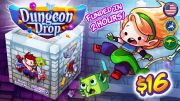Dungeon Drop (Phase Shift Games) – Start the game by creating a hero, combining a race card with a class card. Next you receive your quest, which determines how gems will score points for you at the end of the game. The dungeon is then created by dropping all the starting cubes into the center of the table. On your turn you explore the dungeon by drawing more cubes and dropping them into the dungeon. You then 'act' with your hero by taking the ability either on your race or class card (these allow you to take actions such as flicking or re-dropping cubes). Finally, you loot by selecting three gray cubes in the dungeon. The space between these cubes are a room in the dungeon (a legal room cannot have any additional grey cubes inside it) and you then collect all cubes within this space. Some cubes represent valuables, while others represent monsters and will damage your hero when collected.
Casual Games on Kickstarter: Dungeons, Robots, and the Pigeonpocalypse

June brings a couple of new spins on dungeon crawlers to Kickstarter, as well as a number of sci-fi themed games, including the sequel to Escape the Dark Castle. Throw in a pun-filled card game and pigeons armed for war, and you’ve got a fun list of seven games to check out.
Two Robots (Two Robots, Inc.) – Players have two possible victory conditions to work towards: either construct two complete robots (by collecting a stack of four unique part cards of matching colors for each robot) or eliminate opponent players. On your turn you draw three cards and then take up to three actions. You may play a card into one of your robot stacks, or play an attack or defense card. Attack and defense cards show a number, you must have at least that many robot stacks in order to play that card. During the event phase of your turn, you may choose to sacrifice cards from your stacks to activate special abilities or to deploy a completed robot.
Escape the Dark Sector (Themeborne) – From the makers of Escape the Dark Castle, comes Escape the Dark Sector. Sharing many of the same concepts of the first game, Escape the Dark Sector is a simple sci-fi adventure cooperative game. Each player selects a character and receives the hero die associated with that character. Players must work their way through the chapter cards, reading aloud the text on the cards as they drawn them, and dealing with the challenges presented. If you complete every chapter card without any character losing too much health and dying, players then encounter the final boss; defeat him and you win the game. The chapter cards are divided into three acts which steadily grow more difficult as you advance. The chapter cards used each game are randomized, creating a different story for your space explorers each time you play.
Pigeonpocalypse (Marek Matas) – Players represent the animals of a park, determined to drive the visitors out once and for all. During a round, the visitors are placed in the center of the table. Players take turns placing a card face down on the visitors they want to attack, continuing to take turns until they have each played all the cards they wish to play that round. Cards are then revealed, and each visitor card is awarded to the player who had the strongest attack power played on it. Special ability cards can be used for things such as moving an opponent’s cards or protecting your own. The player who earns the most points from defeated visitors by the end of the game, wins.
Cover Your Kingdom (Grandpa Beck's Games) – Each player controls a magical kingdom. There are two regions in each kingdom: the mountains and the valleys. Each monster has a preferred region. Each creature also has a number which is how many points it is worth at the end of the game. To add a creature to your kingdom, you must play it along with a matching card; these are then placed into your kingdom as a stack. When you play a new stack into a region that already has one, it is placed on top. The stack currently on top of a region is vulnerable to being stolen. An opponent can play a card that matches one of your stacks in an attempt to steal it. You may counter this card with your own matching creature card, and you may each continue to counter each other with matching cards as long as you choose or can. The player who wins the stack then takes all cards played into the dispute and places them in their own kingdom. Meanwhile, there are also special creatures not on the search for a kingdom to join, but rather give players special abilities such as discarding a creature stack from an opponent's kingdom or swapping one of your stacks with another player’s.
Afternova (R2i Games) – A supernova has shattered planets, leaving planet fragments behind. Players are scavengers who hire workers to collect fragments, which they in turn use to build blueprint cards that give them special abilities and victory points. The workers each have skill icons on them, which must match the skills listed on a planet card in order to collect its fragments. In turn the planets have different colored fragments which match those on the blueprints. It's difficult to collect enough workers to complete a planet card by yourself, so players can negotiate, striking deals to collect a planet card together and making agreements over who will get which fragments from off of the card.
Dungeon Royale (Gatwick Games) – Inspired by retro video games with a matching aesthetic, Dungeon Royale takes place over two phases. During the first phase, players take turns simultaneously, moving through the dungeon and completing quest cards by collecting items in the dungeon. Players can use spells and weapons to attack opponents, and you can even die, respawning elsewhere in the dungeon. As the game progresses players gain experience and level up. Once a player reaches level three, the stone of life is added to the board. Once a player leaves the dungeon with the stone of life (or exits after reaching level three) the game ends and the player with the most points (from quests, artifacts, and valuables) wins the game. You can read our article on the game here.
Disclosure: unless otherwise noted, we have not seen or played any of the above games. Our assessment of each is based on the information given on the crowdfunding project page.











